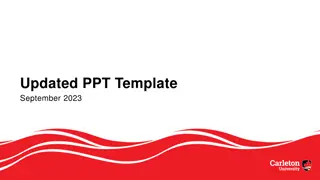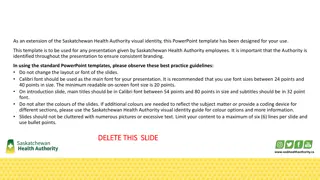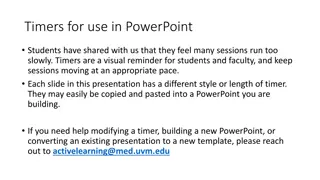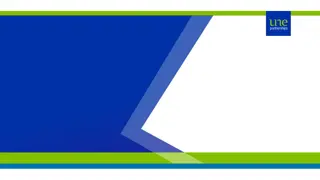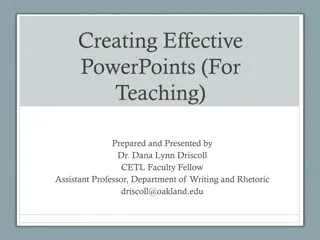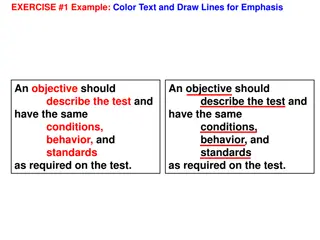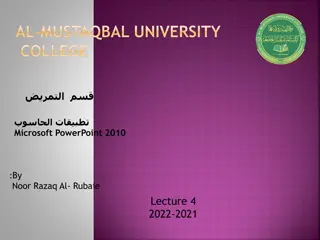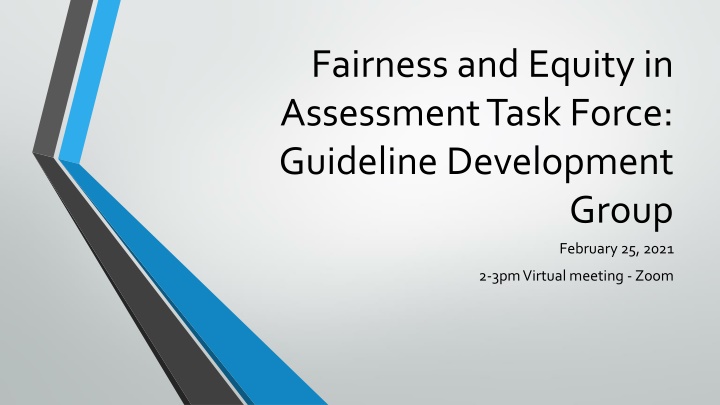
Addressing Fairness and Equity Issues in Assessment at UF: Guidelines Development Group Meeting
The Fairness and Equity in Assessment Task Force at UF is dedicated to developing guidelines to ensure fairness and equity in assessment processes university-wide. Key issues include biases in student evaluations, standardized testing for admissions, transparency in research assessments, and biases towards underrepresented groups. Join the initiative to promote fairness and equity in education.
Download Presentation

Please find below an Image/Link to download the presentation.
The content on the website is provided AS IS for your information and personal use only. It may not be sold, licensed, or shared on other websites without obtaining consent from the author. If you encounter any issues during the download, it is possible that the publisher has removed the file from their server.
You are allowed to download the files provided on this website for personal or commercial use, subject to the condition that they are used lawfully. All files are the property of their respective owners.
The content on the website is provided AS IS for your information and personal use only. It may not be sold, licensed, or shared on other websites without obtaining consent from the author.
E N D
Presentation Transcript
Fairness and Equity in Assessment Task Force: Guideline Development Group February 25, 2021 2-3pmVirtual meeting -Zoom
The Charge The Guideline Development Group Role Introductions Group Repository Agenda Concerns/Issues Work for Next Two Weeks Questions, Comments, Suggestions
The Task Force is charged with establishing a set of guidelines for UF faculty, instructors, staff, and administrators to help ensure fairness and equity in assessment in all contexts at the university. The guidelines must address fairness and equity in the entire assessment process, including development, opportunity to learn, administration, scoring, score interpretations, and the evaluation of the measurement properties of the assessment. The Charge
Guideline Development Group Work with David Miller and Teresa Mutahi to develop the guidelines and review the recommendations from the model development group, and where mutually agreeable, implement the recommendations to modify the guidelines. Guideline Group
Name Introductions Unit and Position Most pressing fairness and equity issue at UF
Options: TEAMs https://teams.microsoft.com/_#/school/files/General?threadId=1 9%3A7a054459272140ecb5bd0aeb624e5a9a%40thread.tacv2&c tx=channel&context=FEA%2520Guidelines%2520Group%2520C ollaborative%2520work&rootfolder=%252Fteams%252FFairness andEquityinAssessmentGuidelinesDevelopmentGroup%252FSh ared%2520Documents%252FGeneral%252FFEA%2520Guideline s%2520Group%2520Collaborative%2520work Group Repository Dropbox https://www.dropbox.com/s/c1x20k1x16df6sq/guidelines%20group%20worki ng%20document.docx?dl=0 Google Doc https://drive.google.com/drive/folders/13c4P- 4dPwyO_BfkDAJ1_OJkYDnQlJ_Kr?usp=sharing
FAIRNESS AND EQUITY ISSUES Heavy use of student evaluations for faculty decisions, with biases in such evaluations for faculty of color and women Emphasis on standardized tests for student admissions with uniform requirements across colleges, despite knowing that such test scores can be influenced by lack of access to resources- e.g. GRE Internal research assessments (e.g., for SEED funds) lacking transparency and fairness for faculty, which is particularly problematic when underrepresented faculty rarely receive these funds Biases toward students, staff, and faculty of color that range from BIPOC physicians and faculty being mistaken for custodial staff and Black students being less likely to receive A grades even when controlling for performance factors Inconsistent grading and assignments in and across UF classrooms and programs, with some units finding evidence of bias against black students in course grades Inadequate faculty training in assessment and fairness Lack of time for instructors to develop and evaluate assessments
FAIRNESS AND EQUITY ISSUES Disparities in technology use and access that affect student differently based on their financial status and living arrangements Disparities in assessment administration conditions (e.g., student home environment differences; issues in using proctoring services under different assessment conditions) Balancing the need for uniform grading of students with the desire for assessment of higher-level constructs Barriers in classroom assessment for students with English as a second language Lack of transparency in assessments Lack of diverse reviewers of student work, leaving the work of underrepresented students being evaluated by reviewers from the dominant culture Reliance on external board exams /licensure by some programs/colleges leaving little room to address equity and fairness issues on final assessments
FAIRNESS AND EQUITY ISSUES Other Concerns or Issues
Define areas for Guidelines Guideline areas may include activities (e.g., assessment development) or types of assessment (e.g., admissions testing) or other areas Contribute to discussion of defining areas for Guidelines Select an area that you want to work on specific guidelines Come to next meeting to collaboratively work on specific guidelines in one area Work for Next Two Weeks
Questions? Comments? Suggestions? Next Meeting on Thursday March 11th2-3pm

